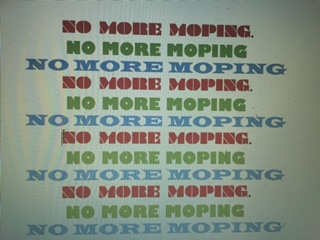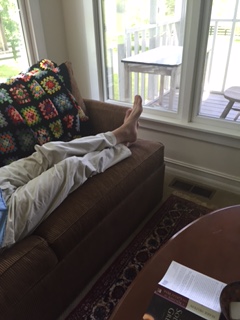
There has been quite a bit of discussion lately on the blogosphere about how to label or not label people with dementia, specifically whether the word “sufferer” is verboten. I am not yet brave enough to discuss the issue in detail [although basically I’m all for not labeling, but I’m also for being free to label myself any way I want without feeling as if I’ve broken some rule], but it’s got me thinking a lot about labels in general. Not so much Ralph’s as my own.
And maybe LABEL is the wrong word. Maybe I mean ROLE.
Over the last couple of years, I have grown to think of myself more and more as Ralph’s “caregiver” and have heard myself talk (pontificate?) about what being a “Caretaker” entails. It’s such an easy catchall phrase. But now I am beginning to rethink just how I should describe myself.
During the last ten years of my mother’s life I was the primary “family caretaker” although there were always professional caretakers on hand to do the often literally dirty work. She was in my house and I was the one making decisions about her care. I was the one writing checks to those care professionals out of our joint account. I was the one informing my siblings when I sensed a problem. (I was also the one complaining about my siblings and being complained about—butt-calls and miss-directed emails kept us all more informed than we’d like on both counts.) I was the one sitting in the emergency room at least once a month toward the end.
She became less and less my mother than my responsibility, my duty. Ironically, that was when my patience increased. The unresolved conflicts between us became irrelevant, dissolving like the thread doctors use to stitch up torn skin. At some point I stopped feeling like a daughter.
But as fraught as the mother-daughter relationship can be, the husband-wife relationship is fraught in a whole different way–especially in a marriage with a man whose mental world is shrinking while mine is not.
Am I more wife or caregiver? As much as my marriage and relationship with Ralph have changed, despite my new sense of being the decider, I am not sure which way to answer that question.
Because he still annoys me the way only a husband can. The other day he was repeating one of his boastful but charming stories for the third or fourth time in half an hour. That immediate repetition I didn’t mind—it’s the Alzheimer’s speaking—but I have probably heard that story over a hundred times in our life together, since long before any memory loss, and frankly I’m sick of it.
And because I still use that bitchy tone I have always reserved especially for him on occasions of mild to extreme annoyance. Although the issues are smaller these days than in the past, I’ve noticed that my annoyance can be just as extreme. What’s changed is that Ralph doesn’t shout at me or storm out the way he used to. Instead with earnest sincerity, he asks me not to use that tone because it makes him feel bad. And then I have a complicated wifely reaction of guilt and resentment, based on our history and all the times we made each other feel bad.
On the other hand, I still feel the need to get his opinion and advice, on business decisions, on family matters, on what blouse to wear. Of course Ralph used to be extremely opinionated, always ready to give advice whether I was ready to receive it or not. Now he is easily swayed by what I think and really has no opinion on most matters, political, social, or sartorial.
So, yes, Ralph’s reactions to daily life and to me have changed since his diagnosis of Mild Cognitive Impairment/Early Alzheimer’s. But I am not thinking about Ralph right now, but about me, however selfish that sounds. I am worrying how I may be changing.
I have that luxury because Ralph’s mental state is on a plateau; his memory and other symptoms have held steady for the last year. Therefore our marriage is also on a plateau, part purgatory and part second honeymoon, as we watch for signs of the deterioration everyone agrees will be coming sooner or later.
Meanwhile my emotions regarding Ralph, while tempered by my awareness of his diagnosis and prognosis, are pretty much the same as they have been since practically the day we met: a crazy quilt of guilt, contentment, resentment, protectiveness, impatience, loyalty, recalcitrance, affection, annoyance, love and occasional hate.
And my self-definition—creative independent woman, passive helpmate, head of household, housewife, caregiver, care giving wife, wife who cares for, wife who wants to escape to Tahiti—remains constantly in flux. I am the woman I’ve always been, but I’m someone else as well. That caregiver word is there, stuck in the middle, not yet in capital letters.
 (This crazy quilt belonged to my grandmother. Note the centennial snippet.)
(This crazy quilt belonged to my grandmother. Note the centennial snippet.)






 Ralph knows how to relax; but do I?
Ralph knows how to relax; but do I? (rainbow at our farm one recent evening)
(rainbow at our farm one recent evening)



 (This crazy quilt belonged to my grandmother. Note the centennial snippet.)
(This crazy quilt belonged to my grandmother. Note the centennial snippet.)